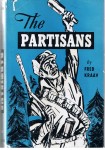The Partisans by Fred Kraav (1952; Vantage Press. ISBN unknown)
When I ordered this used copy of Fred Kraav’s 1952 novel set in the forests of Estonia, I was hoping for the Baltic version of A Farewell to Arms. In point of fact, the book doesn’t measure up to Hemingway’s classic war novel. In fact, it doesn’t measure up to my own first foray into historical war fiction, The Legacy. That’s not a boast; just an observation. Part of the problem may be in that the book appears to have been written in English, a language that was not Kraav’s native tongue, which presents the writer with limited vocabulary choices. Never a good situation when trying to recreate life, war, and love.
Then too the plotting and writing is formulaic. The Soviets are all evil, vodka swilling bastards. The Estonian Forest Brothers (partisans) are all noble, proud, loyal, men of good cheer and strong will. The women throughout the book are essentially props; objects to fall in love with their heroes or be raped by the villainous Reds.
Another problem surfaces in the dust jacket blurb. For whatever reason, Kraav (for Vanatage is the original vanity publisher so this is entirely Kraav’s project from cover to cover) chose to reveal on the inside dust cover that everyone, including the book’s protagonist, Jaan, dies in a hail of Soviet fire. Not a very good way to build suspense, that.
Still, once Kraav has disposed (spoiler alert) of the winsome Helga and sent the partisans scurrying for the safety of Sweden, the plotting improves and, despite the revelations contained in the dust jacket, there is actually a sense of suspense created by the feverish pace of the book’s conclusion.
One other point. Having read Mart Laar’s description of the small scale of the Forest Brothers’ operations throughout Estonia, I have some doubts as to the historical accuracy of the story ultimately being told in this book; that of a platoon (or larger) sized resistance force coming to blows with a full regiment of Soviet and Estonian Security Forces on a beachhead. Laar’s historical accounting (see below) doesn’t seem to reveal such larger scale conflicts as being part of the Forest Brothers’ legacy. Perhaps such a battle did take place but if so, Laar never mentioned it.
A bit disappointing but because of the ending, a worthwhile foray into Estonian fiction. 2 and 1/2 stars out of 5.



